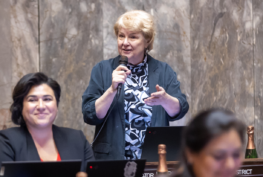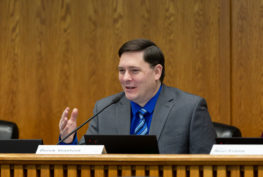Washington would re-establish a statewide legal framework pertaining to controlled substances and expanding behavioral health treatment options, under a bill passed today by the Senate.
In a Feb. 25 decision in the case of State v. Blake, the Washington State Supreme Court struck down the state statute that made possession of controlled substances a class C felony, removing any state criminal penalties for possession.
As amended on the floor today, SB 5476 would make knowing possession of controlled substances a gross misdemeanor and mandate that jurisdictions provide treatment options.
The first two times a person is arrested for possession of a controlled substance, the bill would require that the person be diverted to a treatment program. On subsequent arrests, diversion would be encouraged, but not required.
“The bill we passed today is not the final word on the subject. It is a compromise that keeps this important legislation moving so that we can do our duty as the representatives of the people of our whole state,” said Senate Majority Leader Andy Billig (D-Spokane). “Having a statewide approach focused on treatment is essential. We know that not acting means a patchwork of local ordinances that will be confusing to Washingtonians and won’t provide equal justice across the state.”
The bill would also establish a Substance Use Recovery Services Advisory Committee to make recommendations for future steps to improve substance use treatment and make it more accessible.
Finally, the bill would allow Washington courts to hire court commissioners to help resentence people convicted under the statute struck down by the Supreme Court.
In the past three years, the Legislature has consistently expanded the infrastructure to support a treatment-first approach to substance use disorder, which includes behavioral health co-responder teams, assertive community teams, certified peer support, fire department CARES teams, crisis stabilization services, secure withdrawal management facilities, and supportive housing—work that is continuing this year with legislation on a statewide crisis response hotline and the distribution of opioid overdose reversal medication, as well as funding in the budget.
The bill now moves to the House of Representatives for consideration.
The 2021 legislative session is scheduled to adjourn on April 25.





